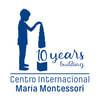PHILOSOPHY
Wonder is an innate mechanism in the child. He/she is amazed by any reality just because it is there; and he is surprised by every way of doing something. María Montessori.
|
There are five pillars that make up the Montessori philosophy: education for life, cosmic education, prepared environment, independence and education for peace.
Our main responsibility as guides is to create the right conditions for the horme* to work, to trust that it will motivate the child and control his or her work without intervening in that work while the child is on his or her journey.
|
Education for Life: Education must prepare children for life intellectually, emotionally, physically and spiritually.
Cosmic Education: to offer children a simple task and from it, be able to outline a panoramic vision of the evolution of man until present day, irresistibly stimulating the imagination and engaging listening. The prepared environment: with order, beauty and harmony, the specially designed learning environments will enable the child to develop to his or her fullest potential, using natural materials that are respectful of the environment. In this way, we get closer to the inner nature of children and their needs for security, autonomy and freedom of movement. The guide is prepared in observation and self-observation. Independence: children learn best on their own, motivated by their innate need to explore and discover. Trusting the child's internal guides (horme*) and being able to allow them to progress at their own pace, with free choice, regardless of their age or skill level. Education for Peace: the Montessori environment contains implicit physical and pedagogical limits, which help develop children's ability to be autonomous, decide, listen, self-regulate, be patient, be tolerant and self-disciplined, offering many learning opportunities for living together in harmony. Our main responsibility as guides is to create the conditions for the horme* to work, to trust that it will motivate the child and control his or her work without intervening in that work while the child is on his or her journey. *Maria Montessori defines the horme as a vital force that is responsible for enabling the child to do what is necessary to develop his or her mind |
.© 2024 | Centro Internacional María Montessori.
C/ Godino, 3. 29009. Málaga
Secretary
☎ 952 91 21 05 | 626 63 21 36
✉ [email protected]
08:00 to 16:00, Monday to Thursday
08:00 to 12:00, Friday
Administration
☎ 640 33 60 63
✉ [email protected]
09:00 to 16:00, Monday to Friday
Enrollment
✉ [email protected]
Work with us
✉ [email protected]
C/ Godino, 3. 29009. Málaga
Secretary
☎ 952 91 21 05 | 626 63 21 36
✉ [email protected]
08:00 to 16:00, Monday to Thursday
08:00 to 12:00, Friday
Administration
☎ 640 33 60 63
✉ [email protected]
09:00 to 16:00, Monday to Friday
Enrollment
✉ [email protected]
Work with us
✉ [email protected]

Esta Web y todo su contenido está bajo una licencia de Creative Commons Reconocimiento-NoComercial-SinObraDerivada 4.0 Internacional.

